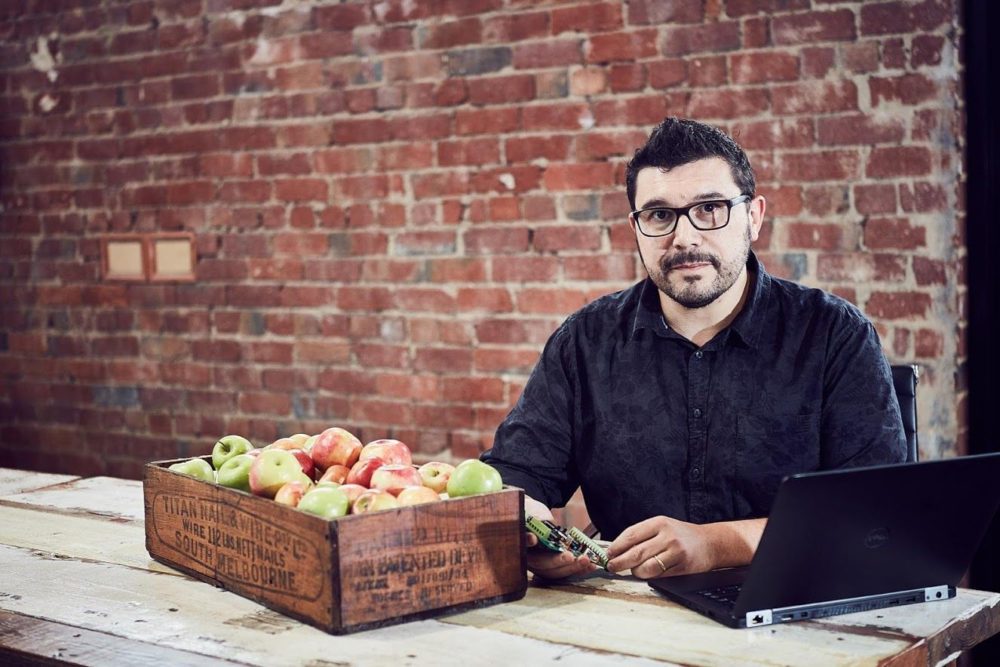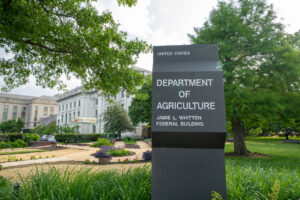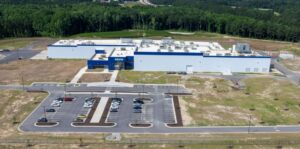This sponsored post has been published in partnership with AgriFutures Australia. The author is Megan Woodward, a journalist and communications specialist based in Yandina Creek, Queensland.
Daniel Pelliccia, CEO and co-founder of Rubens Technologies, never set out to build a career in horticulture. He originally cut his teeth in research as a physicist, developing biomedical applications for x-rays.
“Over the years I’ve developed some ideas to start applying things in more practical ways and eventually changed from medical application to food and agriculture, and it was purely by chance that I started collaborating with agricultural scientists,” he said.
“I was working on a project with the scientists at Agriculture Victoria and they were asking me about technology options, especially how spectroscopy could be applied to food quality. So that idea eventually got some legs of its own and Rubens Technologies was born out of those conversations.”
Squeezing everything out of a clever idea with technology
The key issue Pelliccia started to explore solving was how to make fruit quality assessments a more timely, and far less intrusive, process on farm.
“At the moment most of the fruit quality determinations are invasive. So it’s a destructive process that typically means taking a piece of fruit and squeezing some juice out or poking the fruit to measure how firm it is, among other things,” he explained.
“It’s normally done in the industry as a quality assessment step, but obviously cannot be done on too many fruits. Plus, it’s time consuming, it’s messy, and the data is not digitized in most cases. But it still needs to be collected eventually. When I was talking with the scientists and then starting to talk with growers, I could see there was a need to have some technology that would be easy to use and quick to respond, and wouldn’t require a large amount of work from the grower or the user.”
Pelliccia said that to date, collecting the initial data has been the major roadblock for the adoption of this type of technology, because that’s where specialized knowledge was required.
“The use of spectrometers to assess fruit quality isn’t anything new, but the processes aren’t straightforward and can require a lot of work. I could see that the process had to be simplified and streamlined if we want to have it applied for everyday use.”
One device, multiple problems solved
With a focus on streamlining, Rubens Technologies honed in on the potential of the humble spectrometer – a device that measures the quality of light detected and offers indications of the quality of the fruit or food being evaluated.
“We’ve combined the optical spectrometer with machine learning and developed a single handheld device – imagine something that looks like a torch, for instance – that takes a read of the fruit at the tree, with the head of it going around the fruit and measuring the light reflected from the fruit,” said Pelliccia.
“It depends on the type of crop that we are measuring, but it may read things like the sugar content or the firmness of that fruit, or other parameters that relate to the quality downstream of the supply chain. It’s completely non-destructive for the fruit and offers that array of quality measurements on the spot, so there’s no need to do multiple testings with different systems. The other big advantage is the data is instantly digitized so it can be downloaded by the user from their smartphone and shared with their agent immediately.”
Future-proofing export outcomes from the home paddock
For the year ending June 2020, Australia exported A$3 billion ($2.26 billion) worth of horticultural products, with fresh fruit accounting for the largest value export group at 49% of all horticultural commodities sent overseas.
With a value of nearly A$1.5 billion ($1.13 billion) it’s a sector that relies on optimal harvest timing and a rock-solid guarantee that the quality of fruit provided for export is nothing less than perfect. Pelliccia reckons that’s where the device developed by Rubens Technologies truly shines.
“Growers can receive information on what is the optimal time to pick that fruit and how long the fruit is expected to travel for any given condition of transport or refrigeration,” he said.
“Based on that information, the farmer or distributor will have predictions on the fruit quality, to be able to choose the optimal target market to have fruit in very good condition at the end destination. This sort of information doesn’t exist at the moment, and we’re bringing it to the market so that growers can make more informed decisions around harvest time, and they can target their fruit to the best market.”
Pelliccia said the feedback received from growers trialing the device in various pilot programs — including with Summerfruit Australia, and coconut and pineapple growers in Southeast Asia — has been that it’s easy to use and is a considerable time saver.
“This device replaces the array of other measuring devices that are currently used, and we are seeing that the people most interested are the exporters,” he said.
“That ability to not only read the quality of the fruit now, but also how it’s going to be in a few weeks, addresses the issue of major potential losses for exporters.”
Seeds planted, Rubens Technologies is ready to grow
With the final version of the fruit quality testing system completed, expressions of interest are now open for fruit growers interested in adopting Rubens Technologies on farm.
“We are open to having it trialed in any fruit crop, whether that’s strawberries or kiwifruit – not just the fruits we’ve pilot assessed so far,” said Pelliccia.
“We know that the technology in general works for all fruits, and the important thing is developing the right machine learning model because we recognize that requirements are different for different industries. We’re ready to start manufacturing devices to deploy it as a plug-and-play option for early adopters from later this season.”
The power of the evokeAG. Startup Network Program
Pelliccia is one of nine successful agritech founders chosen to take part in the evokeAG. 2021 Startup Network Program.
He said it has been an incredible opportunity to garner fresh insights into agriculture and the Australian startup ecosystem.
“It was really good for me to see the community and get in touch with the other startups, and I found the program very interesting,” he said.
“We had guests and experts that would talk to us about different aspects, so it was really useful for me to have more networking opportunities outside of Victoria also.”
He said the support of likeminded founders has helped him curate his vision for the future.
“We have learnt with Covid-19 that things can change so quickly. But I hope to see Rubens Technologies growing over the next five to 10 years to the level of offering fruit intelligence for food quality assessment in Australia and overseas as a service,” he added.
“We are open to collaborate with existing providers and with existing data platforms to integrate our data together, so we’re excited for the journey ahead at Rubens Technologies.”
To ensure global agrifoodtech startups continue to build their networks, and connections into the Australian and New Zealand market. evokeAG. has launched the Global Solutions Demo Day. This is a unique opportunity for international startups to pitch their ready-to-scale solutions to one of Australia’s six industry challenges — which will be identified through a consultation process — and apply to pitch at the Demo Day, to be held two-weeks post the evokeAG. East event taking place in March 2022. Applications open December 2, 2021 and close January 14, 2022.
For more information on trialing Rubens Technologies’ device, or investment opportunities, enquire via growAG. here.




